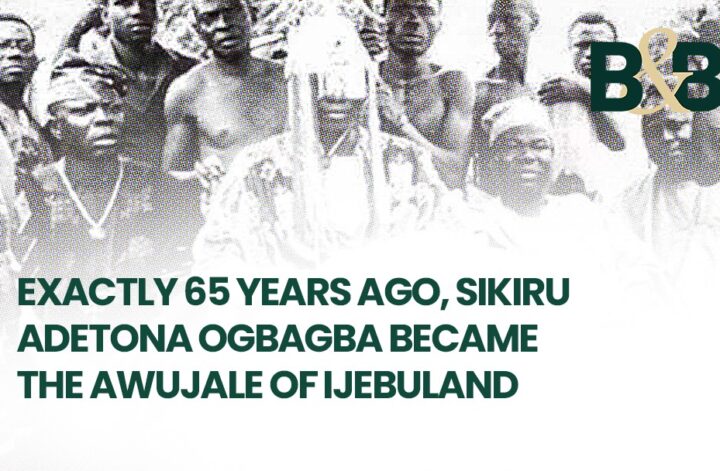Kings reign. Legends endure. And then, there is Sikiru Adetona.
When he ascended the throne on April 2, 1960, as the Awujale of Ijebuland, Nigeria had just shaken off its colonial chains, the Beatles had yet to record their first album, and John F. Kennedy was still a senator. Sixty-five years later, Oba Sikiru Kayode Adetona, Ogbagba II, remains seated—not just on the throne, but in history itself.

In a country where monarchs are sometimes regarded as relics of the past, Oba Adetona has defied time, politics, and even the evolving notion of traditional rulership. He did not simply inherit the throne; he embodied it, redefined it, and molded it into a symbol of cultural defiance.
Awujale of Ijebu Ode, Oba Sikoru Adetona is the longest serving monarch after the death of Queen Elizabeth. Never in the one-thousand-year history of Ijebuland had a king ruled for six decades. Yet, here we are. Sixty-five years later, and the Awujale is still marching on—unyielding, unbowed, and unafraid.
A Throne Not Given, But Earned

Royalty is often mistaken for a privilege, a mere birthright handed down on a velvet cushion. But if history has taught us anything, it is that thrones are not always warm and welcoming. Sometimes, they are made of thorns.
At just 26 years old, Sikiru Adetona ascended the throne, stepping into a world where tradition was colliding with modernity. Young, bold, and unapologetic, he faced resistance from those who questioned how a young man—educated in England and shaped by foreign ideals—could rule a kingdom steeped in ancient customs.
But then again, the Awujale was never one to fit into neat little boxes. He was not just another king; he was a king who reigned on his own terms.

When others bowed to political pressures, he stood tall. When some monarchs played to the gallery, he played for the people. And when the storms came—and oh, they did come—he did not retreat into the shadows of history. He weathered them with the kind of defiance that turns mere rulers into legends.
Turbulence, Defiance, and the Art of Thriving
Nigeria is not a country that makes longevity easy. Monarchs have been deposed, humiliated, and even erased from memory. But the Awujale? He became a moving fortress.
From the turbulent military years to the advent of democracy, his voice has remained firm, clear, and sometimes, inconveniently truthful. He has not always been the easiest monarch to deal with—especially for politicians who expected him to be an ornamental figure. Instead, he chose to be a king who speaks, who acts, and who does not flinch at the weight of his own crown.

This is a man who has had powerful enemies, yet remains untouchable.
A king who has faced storms, yet stands unshaken.
A ruler who has seen Nigeria change in ways once unimaginable, yet continues to command the reverence of a people who see in him not just a monarch, but a symbol of Ijebu’s unbreakable spirit.

Majesty and Glamour: The Unshaken King
If history remembers anything about Awujale Sikiru Adetona, it will not just be his longevity. It will be his presence.
A man of regal bearing, his kaftans are as immaculate as his legacy, his words as weighty as the centuries-old traditions he upholds. When he enters a room, the air shifts, not just in deference, but in acknowledgment of a living monument.

In a world where kings are often reduced to ceremonial roles, he has remained relevant—not by clinging to the past, but by adapting without losing himself.
There are those who wear crowns. And then there are those who become the crown. The Awujale of Ijebuland is firmly in the latter category.
So, What’s the Secret?
How does a man sit on a throne for sixty-five years without being consumed by its weight?
How does a monarch remain untarnished in a country where power is often a fleeting illusion?
How does a king become both a guardian of the past and a force in the present?
The answers may not be simple, but one thing is clear—leadership is not about the seat, but about the spine of the one who sits on it. And for six and a half decades, Oba Sikiru Adetona’s spine has never bent.
A Legacy Still Being Written
Some kings are remembered for their wealth. Others, for their battles. But the greatest ones? They are remembered for their resilience, their vision, and their refusal to be erased by time.
The Awujale is not just a king; he is an institution, a testament, a masterclass in longevity.
And as the sun sets on yet another year of his reign, one thing remains certain: history will remember his name, but legends? They will tell his story.





